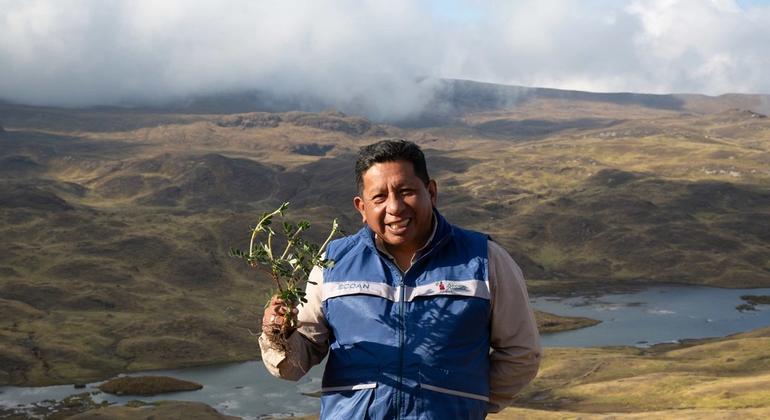
Guterres: The Alliance of Civilizations promotes more resilient societies
The world knows what to do to curb the climate crisis, address global inequalities, prevent further instability and stop the spread of conflict, but the real challenge we face is how to do it, the government said Tuesday. General secretary of the United Nations.
In his opening speech at the ninth World Forum of the Alliance of Civilizations, which is being held in the Moroccan city of Fez, António Guterres pointed out that the challenge is not "what" but "how" to deal with these problems.
“How to ensure cooperation. How to increase ambition. How to gather resources. How to get the political will. How to drive action at all levels, from global to local. And how to act with solidarity ”, for this reason he indicated that“ the Alliance of Civilizations is helping to show the way ”.
Guterres said that the Alliance embodies the fundamental values enshrined in the United Nations Charter, promotes more resilient and cohesive societies. Additionally, he works to build bridges and help people by trading conflict for collaboration.
“Together, we can build a peace alliance that encompasses the global and the local to face the needs that our present poses,” concluded Guterres.
A Peruvian initiative awarded with the Champions of the Earth award

The Program of the United Nations for the Environment announced that Tuesday the winners of the prize Earth Champions which honored a Peruvian ecologist, a Lebanese company, a British economist, a Cameroonian women's rights activist and an Indian biologist.
The award for Latin America went to the Co-founder of the Association of Andean Ecosystems and president of Acción Andina, Constantino Aucca Chutas, who managed to plant more than three million trees in Peru and protected or restored 30.000 hectares of land.
The initiative helped Indigenous communities, a traditionally marginalized group, secure legal rights to their lands and establish protected areas for their indigenous forests.
The executive director of the Program, Inger Andersen, recalled that “healthy and functional ecosystems are essential to prevent the climate emergency and the loss of biodiversity from causing irreversible damage to our planet. This year's Champions of the Earth give us hope that our relationship with nature can be mended".
The annual Champions of the Earth award is the UN's highest environmental award and since its creation in 2005 it has been awarded to people who are at the forefront of initiatives in favor of nature protection.
UN Human Rights urges Iran to meet demands for equality and dignity

The growing number of deaths in the protests in Iran, including those of two children last weekend, and the tightening of the response to the demonstrations by security forces, highlight the critical situation in the country, he said today. the UN High Commissioner for Human Rights, Volker Türk.
We hear from Türk spokesman Jeremy Laurence.
“We urge the authorities to meet the demands for equality, dignity and rights of the population, instead of using unnecessary or disproportionate force to suppress the protests. The lack of accountability for the serious human rights violations that are committed in Iran persists and contributes to the increase in grievances"I affirm.
Since the start of the nationwide protests on September 16, more than 300 people have died, including more than 40 children.
Laurence called it “particularly worrying the apparent refusal of the authorities to hand over the bodies of the murdered people to their families”, or that the delivery of the remains be conditioned "on the fact that the families do not speak to the media or agree to give a false version of the cause of death."
The spokesman reminded the Iranian authorities that, under the International Law of human rights, have the obligation to respect and guarantee the rights of peaceful assembly and freedom of expression.
The resumption of the death penalty in Saudi Arabia is "deeply regrettable"

Following the end of an unofficial 21-month moratorium on the use of the death penalty for drug-related offences, executions have occurred almost daily in Saudi Arabia for the past two weeks, the Türk Office reported.
Since last November 10, 17 men have been executed for the so-called drug crimes and smuggling. Those executed to date are four Syrians, three Pakistanis, three Jordanians and seven Saudis.
The organization's spokeswoman, Lizz Throssell, explained that executions in Saudi Arabia are only confirmed after they take place and that for this reason she does not have the necessary information to know how many people may be on death row.
“The resumption of executions for drug-related offenses in Saudi Arabia is a deeply regrettable move, all the more so when it comes just days after a vast majority of states in the General Assembly call for a moratorium on the death penalty all over the world," the spokesperson recalled.
Finally, he recalled that imposing the death penalty for drug-related offenses is a measure incompatible with international regulations and asked the Saudi authorities to adopt a moratorium on executions and commute the death sentences linked to this type of crime, and to guarantee the right to a fair trial for all accused.
